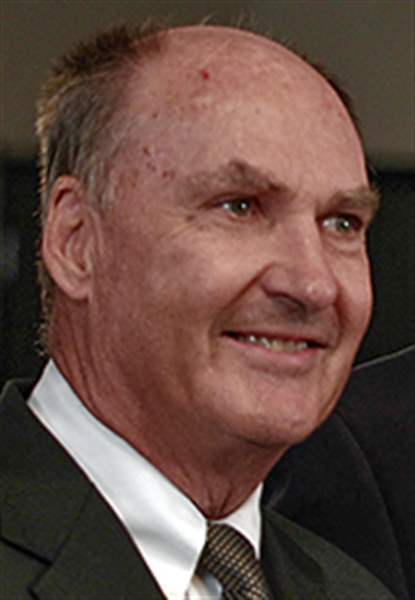
Commentary
Conferences want to take, but not give
9/29/2013
Delany
ASSOCIATED PRESS

Big Ten commissioner Jim Delany threw down an interesting gauntlet last week. I agree with some of what he said. But he was utterly hypocritical for saying it.
Delany was addressing the ongoing move to pay college athletes and, in part, he said:
“Maybe in football and basketball it would work better if more kids had a chance to go directly to the professional ranks. If they’re not comfortable and want to monetize, let the minor leagues flourish. Train at [sports academies], get agents to invest in your body, get agents to invest in your likeness and establish it on your own.
“But don’t come here and say, ‘We want to be paid $25,000 or $50,000.’ Go to the D-League and get it; go to the NBA and get it; go to the NFL and get it. Don’t ask us what we’ve been doing.”

Delany
Delany bemoaned that college athletics, in some cases, has become a free training ground for the pro ranks, particularly football and basketball, where age rules prevent the best players from qualifying for the NFL or NBA right out of high school. He suggested that top players could sign with agents who could generate income to hire trainers and coaches and dietitians and weight-lifting experts to prepare athletes for the next level on their own.
“They can get as strong and as fast in that environment as they can in this environment,” he said. “Plus, they don’t have to go to school. Plus, they can sell their likeness and do whatever they want to do. We don’t want to do that. What we want to do is do what we’ve been doing for 100 years.”
And what the Big Ten and other power conferences and their member schools have been doing for quite a while now is exploiting amateur athletes, some of whom have little or no interest in a college education, to generate extraordinary wealth.
Delany’s message is noteworthy, perhaps, but by playing the messenger he seemed very much out of line.
In recent years his conference has signed lucrative TV contracts, established its own cable network, raided other leagues for additional members, added revenue from a football championship game, and stood by as member schools charge exorbitant amounts for tickets, parking passes, replica jerseys, and hot dogs that are turned into multi-million dollar contracts for coaches and can-you-top-this facilities.
Yet Delany plays the indignant purist who would continue to give the athletes nothing beyond their annually renewable grants for tuition, books, room and board.
Once upon a time, as all fairy tales begin, that was enough. But times change, people change, the culture and abuses change, and the cost of doing business changes. Plus, one of these days, somebody might actually read the U.S. Constitution.
Some of what he said, of course, is true. While pro baseball and hockey, for example, invest in minor leagues to develop players, the NFL and NBA have been delighted to create arbitrary rules that let colleges do it for them at no cost. The NBA’s one-and-done opportunity has been extremely harmful to the college game, at least at the top level.
So I understand Delany’s frustration. But football and March Madness are the golden geese, and if he truly meant what he said I wonder how many Big Ten fans would be excited by the product left behind.
Regardless, the college model is going to change, and it had best be soon. There are no easy answers, only questions, but athletes will receive compensation in some form whether it’s a small stipend to cover basic costs of living or something larger and more complicated designed to encourage staying in school.
Bluster aside, Delany knows as well as anybody it is coming, and he suggested that the power conferences need “legislative autonomy” to push through changes. That’s another way of saying good-bye to the NCAA, which might not be an altogether bad idea, and perhaps to the mid-majors, who unfortunately might find themselves thrown under the bus.
It will happen because the athletes are ready to make it happen. Players on a few football teams scribbled APU, standing for All Players United, on jerseys and cleats and sweat bands last weekend. It was a small gesture that got big notice.
One of these days, two teams might line up for an opening kickoff in prime time on national TV and 22 gutsy players will take a seat on the turf.
They are beginning to understand they hold the power, and if Jim Delany and other power brokers in college athletics don’t do something to appease them, it might come to that.
Contact Blade sports columnist Dave Hackenberg at: dhack@theblade.com or 419-724-6398.